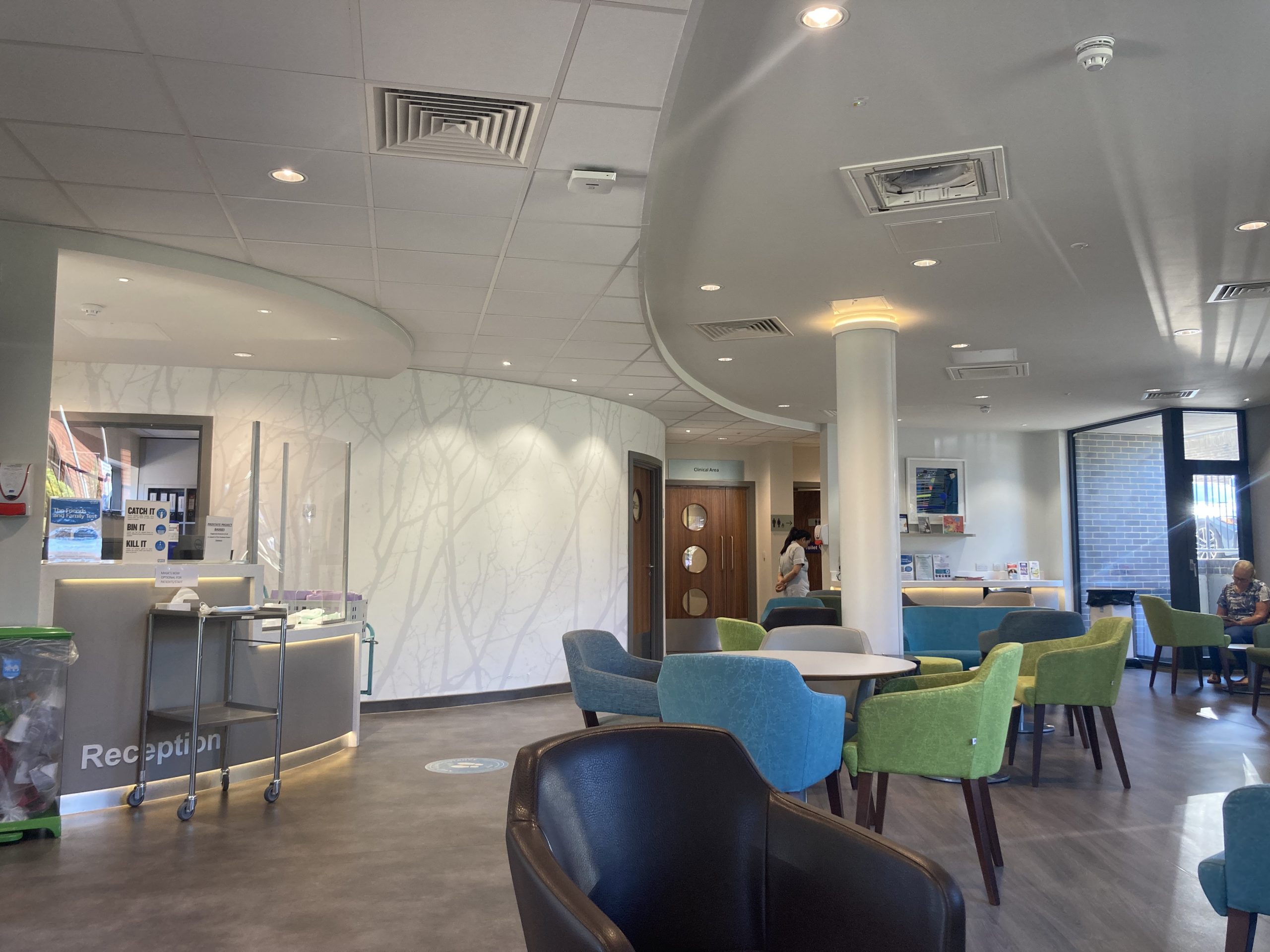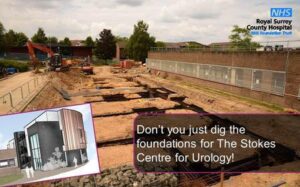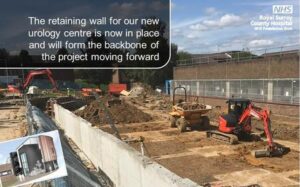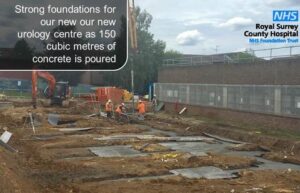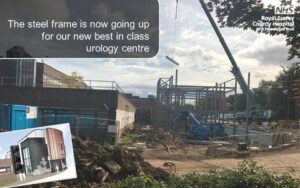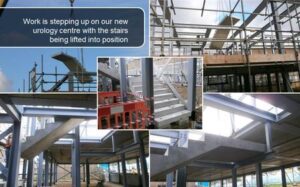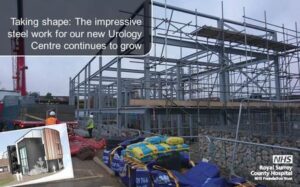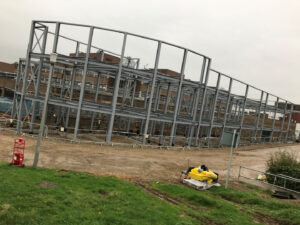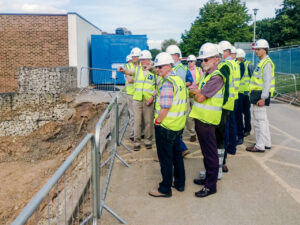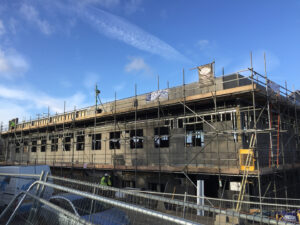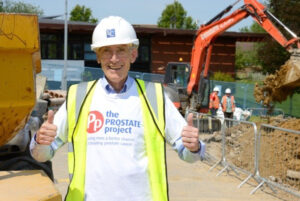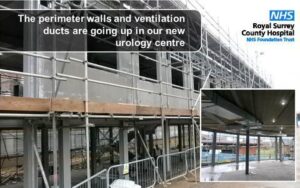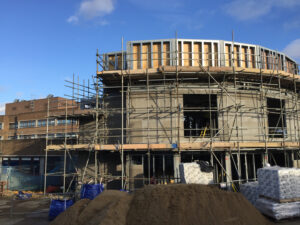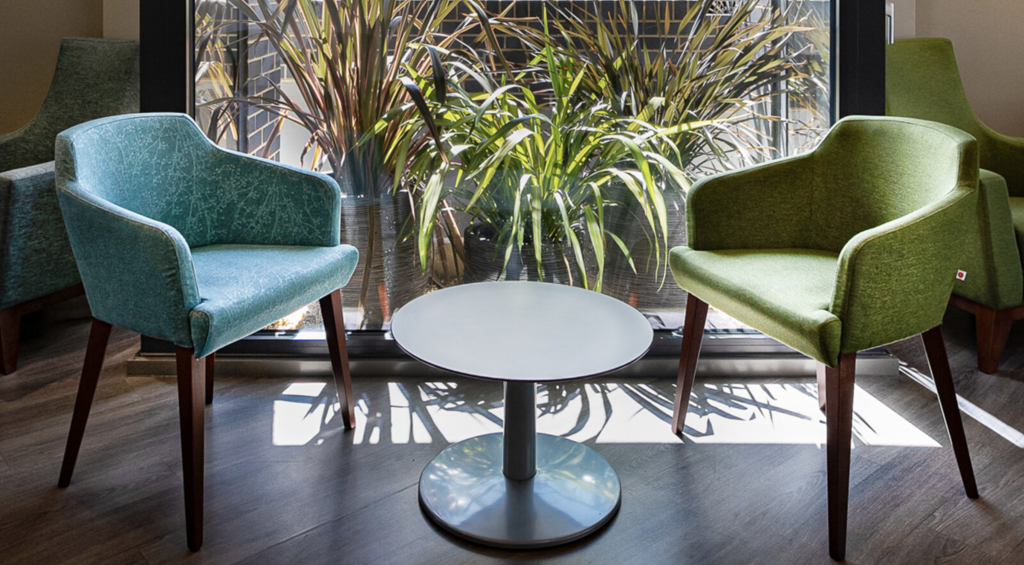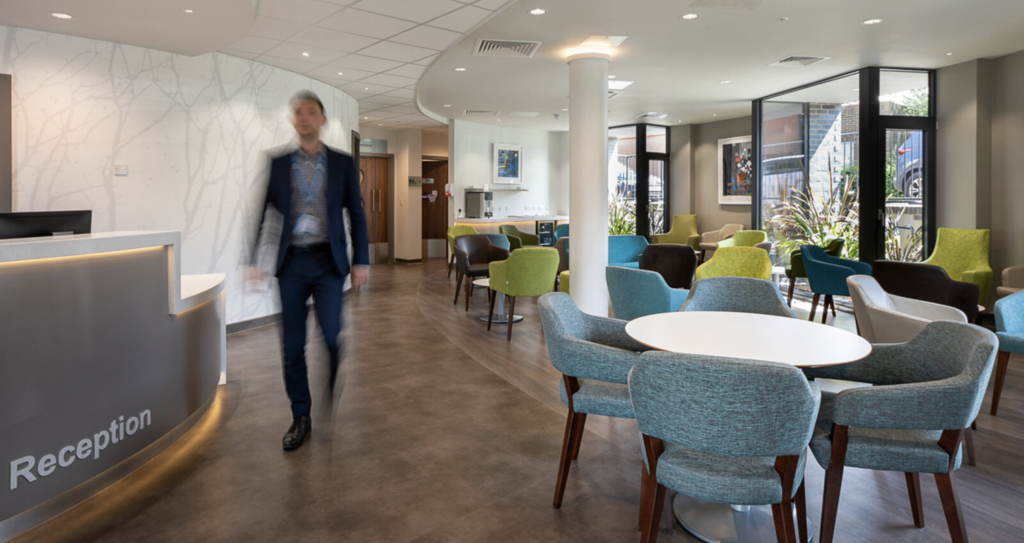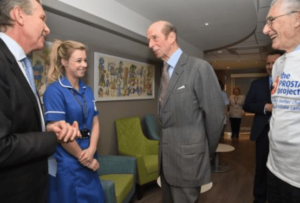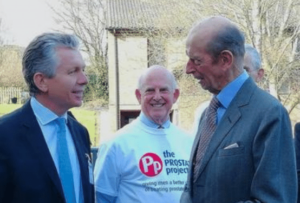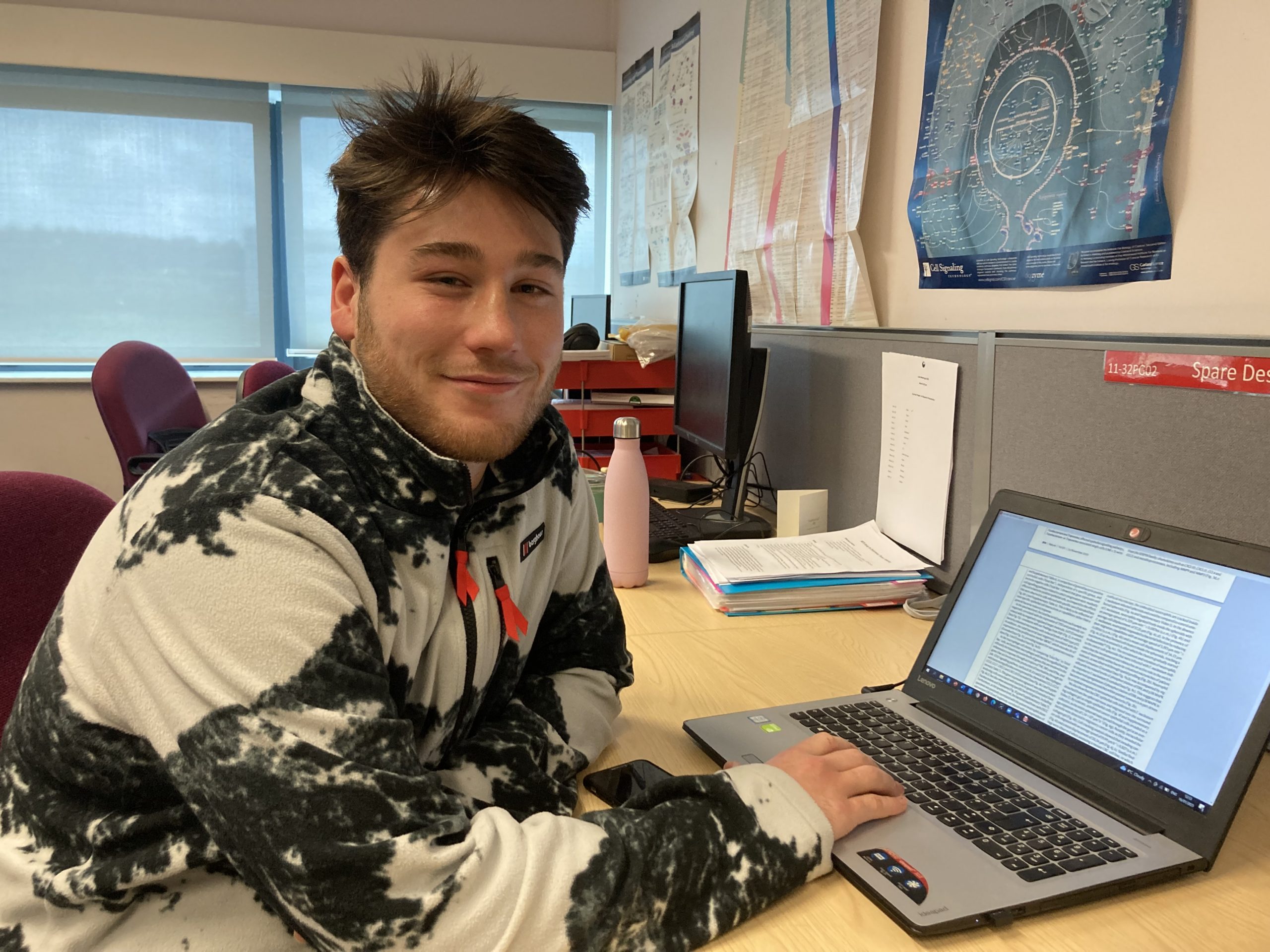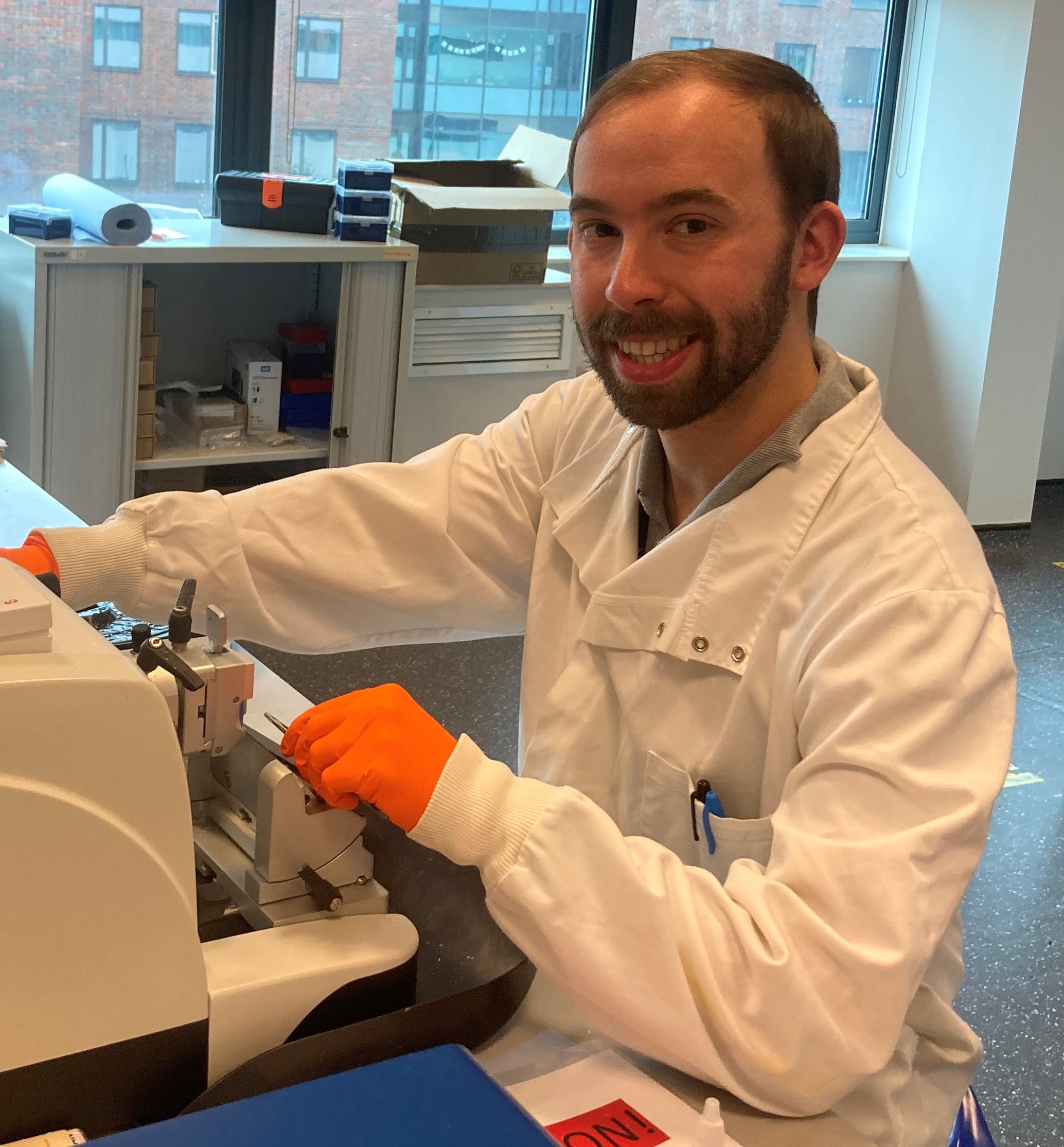The difference you make
In the past 25 years we have raised over £8 million and helped the Royal Surrey County Hospital achieve ‘Centre of Excellence’ status in the treatment of prostate cancer. We support the Royal Surrey County Hospital, St Luke’s Cancer Centre and Frimley Park Hospital in their efforts to detect and treat prostate cancer. We have provided equipment, specialist nursing staff and run an active patient support group.
The Prostate Project also funds the scientists working at the University of Surrey, supporting their work developing innovative immunotherapy treatments and drugs for men with advanced (metastatic) prostate cancer. Recent research has also started into why there are racial disparities in outcomes in prostate cancer (I in 4 black will get prostate cancer, compared to 1 in 8 in other men).
We pride ourselves in being a volunteer-run charity, with very low overheads. So you can donate in confidence, knowing at 94 pence in every £1 donated goes directly to the point of need. However, we recognise it costs money to raise money and we continuously look to make savings wherever we can.
There are too many areas that we have supported over the years to list in detail, but here are a few recent highlights:
1.Histolog Scanner – 2025
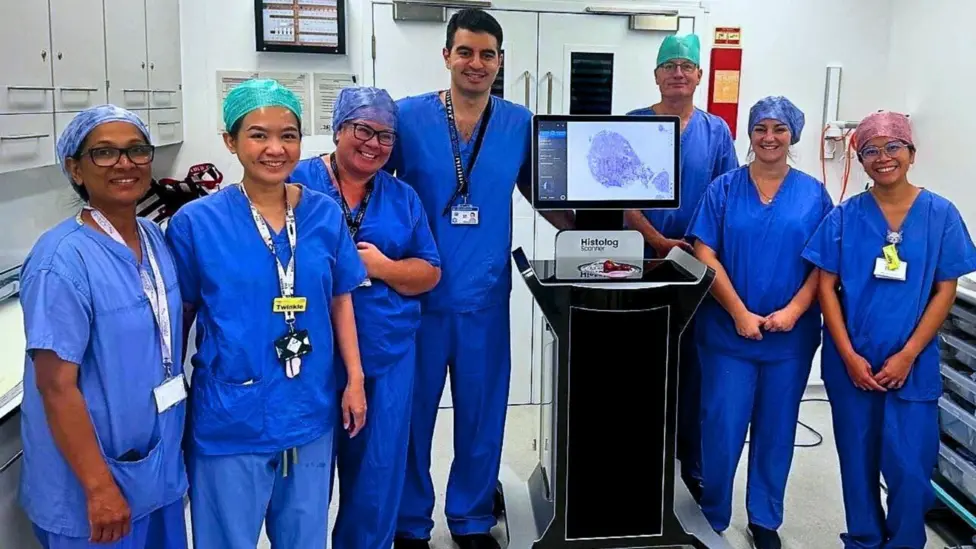
The Histolog® Scanner is a revolutionary new device designed to enhance prostate cancer surgery outcomes and reduce the chances of having radiotherapy by allowing surgeons to assess the prostate for cancerous tissue in real time during surgery, rather than waiting for post-operative pathology results.
It should be noted that Royal Surrey is the first NHS Trust in the UK to acquire this device, further establishing the site as a leading centre for treatment.
Our Surgeons will now be able to adjust surgical planes and remove additional tissue if required, potentially reducing the risk of leaving behind cancerous cells and significantly lowering the chance that patients will require follow-up radiotherapy.
Wissam Abou-Chedid, Consultant Urological Surgeon at Royal Surrey, said:
“This technology marks a real leap forward in prostate cancer surgery. For the first time, we can assess tissue in real time while the patient is still on the operating table – allowing us to make immediate, informed decisions that improve cancer control without putting quality of life at risk.
It means fewer patients needing radiotherapy afterwards, and more men retaining their continence and sexual function. It’s transformative, and I’m incredibly proud that Royal Surrey is leading the way.”
Royal Surrey’s Urology Clinical Director and Prostate Project Trustee, Dimitrios Moschonas, added
“Introducing the use of Histolog® further cements Royal Surrey’s position as a national leader in prostate cancer treatment and robotic surgery.
I am hugely proud and thankful that we have such a wonderful team within urology, who are always working tirelessly to help drive forward improvements in patient care. As the highest-volume single-site centre for robotic prostatectomy in the UK, Royal Surrey continues to lead with pioneering initiatives.’’
2. Echolaser – 2024

The Urology Team at Royal Surrey NHS Foundation Trust (Royal Surrey) has launched a pioneering treatment for benign prostate enlargement, which affects around 50 per cent of men aged 50 and over. Thanks to a generous donation from the Prostate Project charity, Royal Surrey is now one of just a handful of UK NHS Trusts offering EchoLaser treatment for patients with benign enlarged prostates.
The ground-breaking treatment uses laser light transmitted by optical fibres to create cavities that help shrink the size of the prostate. This reduces the compression on a patient’s bladder to relieve urinary problems and improve quality of life. Dimitrios Moschonas, Consultant Urological Surgeon and Clinical Director of Urology , said: “This minimally invasive procedure benefits our patients in many ways by facilitating rapid recovery, reducing side effects such as damage to healthy tissue, and ensuring that there is little or no risk to sexual function.
“Previously our patients would have had the treatment under general anaesthetic and faced an overnight hospital stay, now they are able to go home within an hour of having the procedure. It’s also an efficient way to help elderly patients who may not be suitable for other treatment options. It’s a win, win situation.”
Benign prostate enlargement is a common condition affecting men as they age, causing symptoms that impact on a patient’s quality of life, such as frequent urination, difficulty urinating, interruption to flow, and needing to get up in the night repeatedly to urinate.
Urology Consultant, Wissam Abou-Chedid (pictured), said: “We have seen an influx of patients being referred with prostate problems since King Charles revealed that he was being treated for an enlarged prostate earlier this year. We are finding that our referrals are increasing, as patients are being more proactive about their health and seeking help for problems they previously might have just ignored. Being able to deliver treatments using the EchoLaser equipment is of huge benefit to our Trust and will help us reduce our waiting lists and expand our service. It also potentially gives us the opportunity to help prostate cancer patients with this treatment in the future.”
3. The Stokes Centre for Urology – 2019
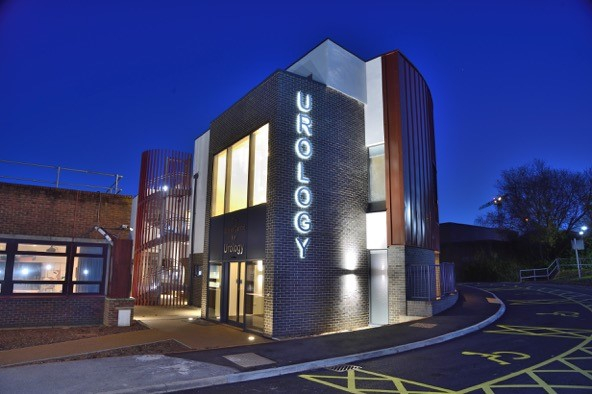
In 2011, the Royal Surrey County Hospital asked us if wecould raise £1.3m towards a new landmark Urology Centre. In 2013 they increased that figure to £2m. Thanks to the incredible support through over 9,000 individual donations, we raised £3million which was matched by a £3million investment from Royal Surrey.
The Stokes Centre, named after Colin Stokes who recently retired as Chair of the Prostate Project, also houses a research laboratory and features a state-of-the-art operating theatre for brachytherapy, which uses tiny radioactive seeds to treat prostate cancer. The unit is the largest in Europe, having treated over 5,000 patients.
The Centre is one of the most significant investments in Urological services in the UK for over a decade, helping to establish the Royal Surrey internationally as a leading prostate cancer centre of excellence, capable of treating more men with early disease than any other unit in the UK. NHS patients experience will be transformed and they will feel like private patients, greeted by a friendly receptionist, coffee and tea making facilities, soft lighting and air con throughout, furniture all different sizes for variety and differing needs.
10 Urological Consultants, 12 Specialist Nurses and 5 consulting rooms with beds for examinations and ultrasound assessments, a treatment room used for minor procedures such as cystoscopies and biopsies,100-120 cystoscopies performed each week.
The Centre is also a showcase for collaboration between the NHS and a local charity, The Prostate Project, enabling a sector-leading Centre to be built delivering world-class facilities and care for patients.
To have created this landmark building in the NHS at a time of austerity is a tremendous achievement and is a wonderful demonstration of how a community can come together with the NHS to deliver a truly world-class result. We will always be grateful to the thousands of generous donors who made this wonderful new Centre a reality. In particular, the support we have received from the Surrey Advertiser, Eagle Radio, Guildford Flames, Surrey Masons, Lisa May Foundation, Rotary clubs, local golf clubs and individual benefactors have helped us to reach the finish line.
Royal Institution for Chartered Surveyors (RICS) Social Impact award in Healthcare 2020
he Stokes Centre for Urology at Royal Surrey NHS Foundation Trust has won the Royal Institution for Chartered Surveyors (RICS) Social Impact award in Healthcare 2020, thanks to a design aimed at improving the dignity and wellbeing of the many hundreds of prostate and bladder cancer patients who are treated there each year.
The RICS award celebrates buildings that have a positive human and social impact and the Stokes Centre does this, offering world-class treatment in attractive surroundings that make patients feel reassured at a difficult time in their lives. As well as offering specialist services for diagnosis, treatment and recovery all under one roof, the Stokes Centre incorporates a calm, relaxed environment, colour schemes inspired by nature, comfort lighting and a welcoming reception area.
“This wonderful new building allows us to deliver the best care to our patients that we all strive to achieve. Now the environment matches the quality of our clinical outcomes. By the minute patients walk through the door of our centre they relax knowing that they will receive the highest quality of care. It is a privilege to work in such a fantastic unit…”
– DONNA HIGGINS, LEAD CLINICAL NURSE SPECIALIST, ROYAL SURREY COUNTY HOSPITAL
HRH The Duke of Kent opens The Stokes Centre for Urology
The Centre was opened at the Royal Surrey County Hospital on March 5, 2019 by HRH The Duke of Kent. Touring the brand-new facility and unveiling a commemorative plaque, the Duke praised the tireless fund-raising which has enabled the centre to open. Staff demonstrated some of the ground-breaking work to HRH The Duke of Kent.

- HRH the Duke of Kent meets Professor Stephen Langley (left), watched by Prostate Project Hon President, Tim Sharp (centre)
‘World-Firsts’
Since the opening of the Stokes Centre, there have been some major milestones and ‘world-firsts’, demonstrating one of the core reasons behind building the Stokes Centre. The quality of the facilities, that you help to support means that the Royal Surrey can attract leading surgeons and consultants to Guildford.
- First proctectomy daycase patient – March 2022. David Naisby was the first proctectomy daycase patient and in March 2023 the 100th cancer patient went home the same day that he had his prostate surgically removed as part of a drive to aid recovery. The initiative has helped save the RSCH more than £17,000 by avoiding unnecessary hospital stays and freeing up vital beds for other patients.
- 5000th brachytherapy patient – July 2022 In a UK first, doctors at Royal Surrey have treated their 5,000th prostate cancer patient with brachytherapy – radioactive ‘seeds’ implanted in or near a tumour to treat cancer.
- Self-removal of catheters -August 2022. The Royal Surrey is the first hospital in the UK to offer self-removal of catheters.
- 12 prostatectomies in 1 day- May 2023 . Royal Surrey surgical teams recently carried out an astonishing 12, robotically assisted radical prostatectomies in a single day, breaking the existing world record and significantly reducing the waiting list for surgery. Five surgeons and four theatre teams performed the operations back-to-back, minimising turnaround time and helping treat more patients. and reducing waiting list by more than 25%
“Advancing prostate cancer surgery” – the Stokes Centre for Urology team at the Royal surrey is breaking records and breaking new ground in prostate cancer surgery. Wissam Abou Chedid speaks to Clinical Services Journal (August 2024) about the potential impact these advances could have if adopted across the UK. Read all about it here
4. Vectra Polaris at the University of Surrey – April 2020
- We purchased a £270,000 piece of technology, the Vectra Polaris, to advance cancer research at the University of Surrey. The Vectra Polaris is a new class of Automated Quantitative Pathology Imaging System that can easily detect and measure up to 9 overlapping biomarkers within a single tissue section. This state of the art technology provides in-depth analysis of interactions between immune and cancerous cells that was previously impossible.Th equipment is vital to the development of cancer immunotherapy, a revolutionary new form of treatment which artificially stimulates the immune system to treat cancer and will help transform cancer care in the UK. In addition, the new machine will provide a valuable service to Royal Surrey County Hospital Pathology UnitTo successfully treat cancer, new innovative treatments which are less toxic to the body are needed. Cancer immunotherapy is one way to achieve this. The use of the Vectra technology and the knowledge we gain from it, will enable us to develop effective collaborations with immunotherapy drug developers and attract clinical trials with novel treatments to the University and Royal Surrey.
- In the following year, we funded at a cost of £10,000, two super computers to support the technology. The computers are capable of processing digital pathology images faster.
5. A New £100,000 Diagnostic Imaging at The Stokes Centre for Urology – October 2020
- We purchased a new life saving £100,000 diagnostic imaging device to detect prostate cancer at the Stokes Centre. The ultrasound machine, made by Hitachi, fuses images from an MRI scan with the live ultrasound image, allowing doctors to detect prostate cancer more accurately. There are only four machines of its type currently in use by NHS Trusts across England. This new Hitachi Ultrasound machine was part of the charity’s ‘Fabulous Fit Out’ appeal to buy equipment for The Stokes Centre for Urology.
- Speaking about the new Hitachi Ultrasound machine, Professor Langley, Professor of Urology at the Stokes Centre, explains:“The best way to detect prostate cancer in our patients is by carrying out an MRI to see if there are any suspicious areas which might represent cancer. However we use ultrasound when we take tissue samples (biopsies) from the prostate to verify whether cancer is present but the abnormalities seen on MRI are often invisible on ultrasound. Therefore, it can be difficult to accurately target the area of suspicion within the gland.
- “This new machine will enable us to fuse together the MRI and ultrasound images in real-time. This is invaluable when we are taking the biopsies and enables us to detect prostate cancer much more accurately. It will also reduce the need to unnecessarily biopsy parts of the gland that are very unlikely to contain cancer and is therefore less invasive for patients”.
6. IncuCyte SX5 – a live cell imaging equipment – April 2021
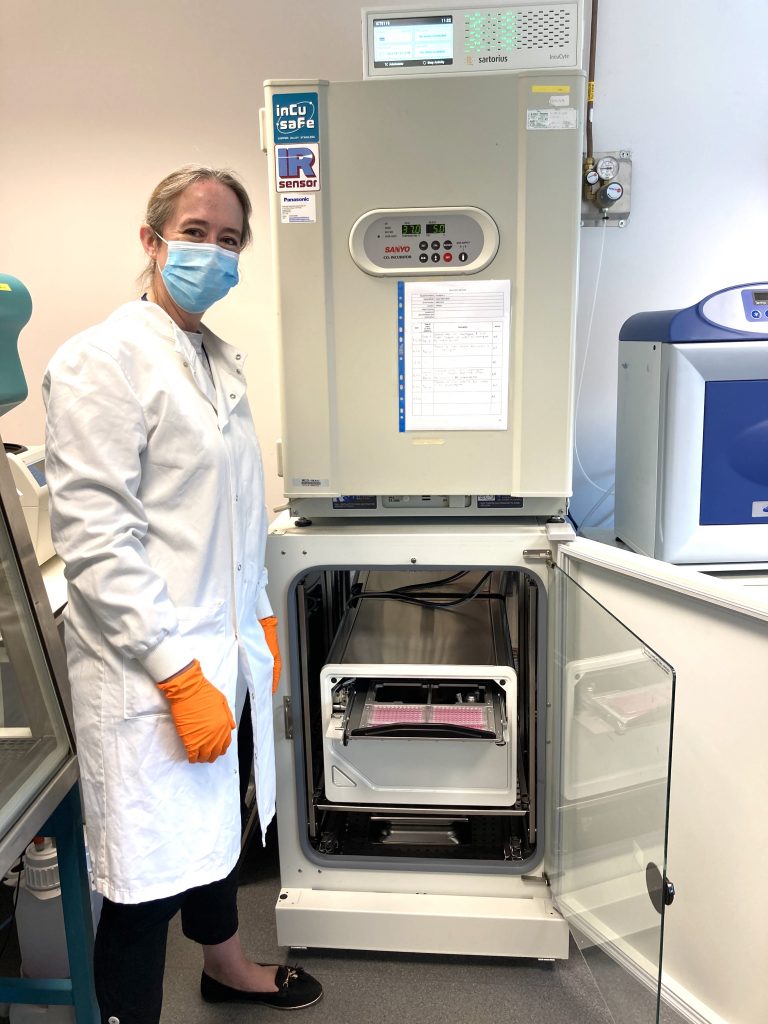 The IncuCyte is a live cell imaging equipment that is specifically designed to fit inside any incubator, with it the research team are able to run experiments from home and access results in real time on personal computers, at home, making the equipment invaluable during lockdown.
The IncuCyte is a live cell imaging equipment that is specifically designed to fit inside any incubator, with it the research team are able to run experiments from home and access results in real time on personal computers, at home, making the equipment invaluable during lockdown.
The equipment does not require operatives to open up the incubator, meaning that optimal culture conditions are maintained, which is essential to cell culturing.
The £160k device is ideal for long term experiments, or example when testing the effects of cancer-killing viruses on cancer cells or testing novel anti-cancer agents which require continuous monitoring. Samples do not have to be sacrificed to set up a time line in studies of dynamic cellular processes.
Since being installed in the lab this technology is being extensively utilized for testing the effects of anti-cancer agents and virotherapy on tumour growth.
The ease of use, ability to consistently image cells in real-time from any computer, and the ability to collect reproducible, high quality results in half the time that it would have taken otherwise, have quickly secured this technology as an indispensable piece of equipment for our research.
We reached our £160,000 goal to purchase this game-changing equipment, thanks to large donations from one of our Patrons and a patient of Professor Hardev Pandha, we also used funds raised via the online art auction, an initiative organised by Dr Nicola Annels, as well as money raised by the Christmas appeal.
5. Biological Specimen Coordinator, Oncology R&D at the University of Surrey labs
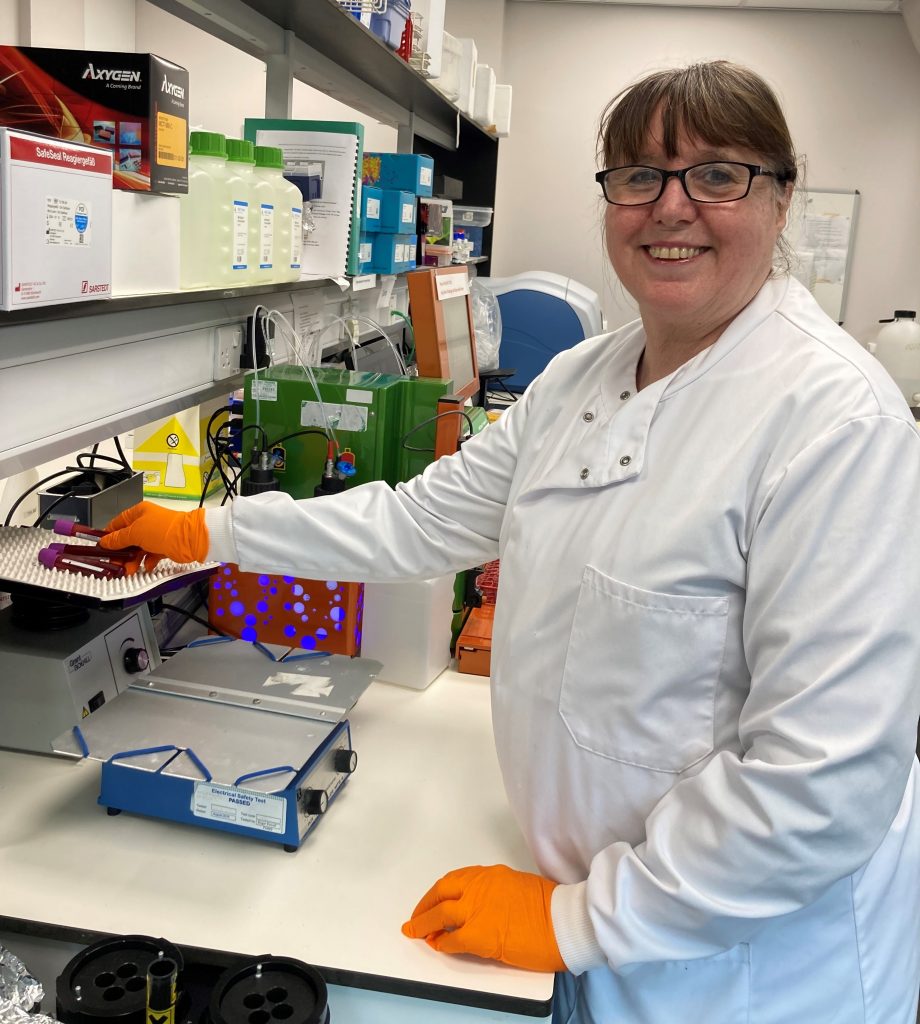
Alongside technology and equipment, we also fund the salaries of vital healthcare and cancer research professionals. Michelle Hammill is one such professional; a Biological Specimen Coordinator, Oncology R&D and she is the bridge between the hospital and the cancer researchers at the University of Surrey.
However, as with every aspect of research, there is a great deal more to it than that. Michelle is a Registered Health Professional and a clinical scientist by training, with over 23 years ‘hands-on’ experience in Pathology Research. And she was also Head of Molecular Genetics at St Thomas’s.
One of Michelle’s primary functions is to identify suitable patients, and approach them for their help with the various research projects the team are working on.
Once Michelle has explained the process of collecting samples, the necessary consents are obtained and Michelle retrieves the samples and delivers them to the research labs for analysis.
6. The SUN Study
The SUN study is an example of a successful project delivered with the support of Prostate Project charity. The SUN study is a biobank of serum and DNA samples from patients with prostate cancer that started approximately 9 years ago. The primary purpose of the SUN study was to collect blood samples from men with a diagnosis of prostate cancer and compare these with samples from an age-related group of healthy men to detect new biomarkers and aid in the early detection and monitoring of prostate cancer. Over the next 2-3 years we consented approximately 600 men, of those 314 men had a diagnosis of prostate cancer and 278 were healthy volunteers. The study has an NHS ethics approval, protocol and consent form and although the active collection has now stopped the biobank contains serum samples, DNA samples and some urine samples.
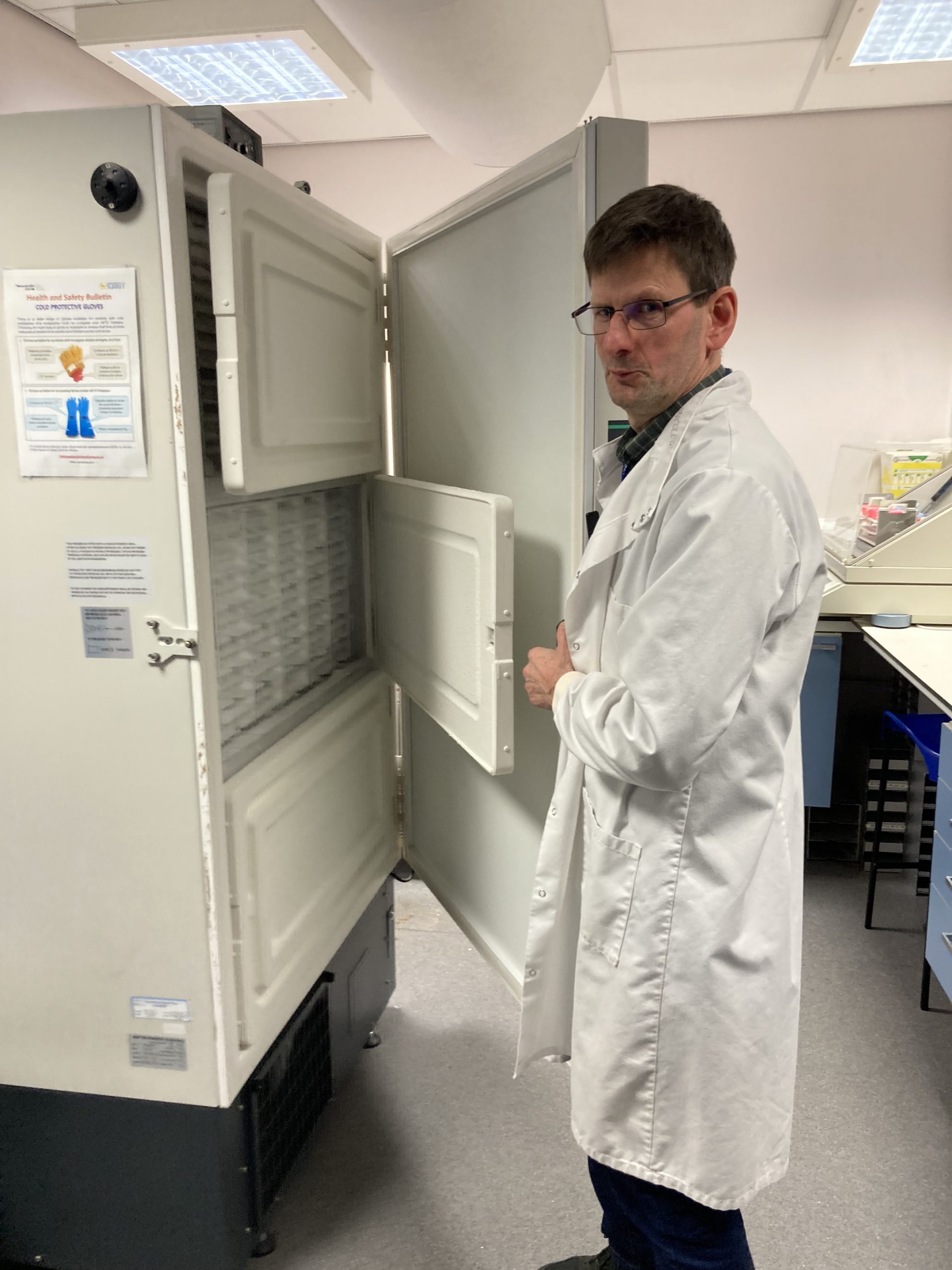
Influence of the Study
The samples collected were subsequently used in many research projects that looked into the early diagnosis and prognosis of prostate cancer. One of the main collaborations is the PRACTICAL consortium. PRACTICAL is a collaborative international group of researchers interested in inherited risk of prostate cancer. Many groups are conducting studies with the aim of identifying genes that may be related to the risk of prostate cancer. The aim of the group is to combine data from many studies, to provide a reliable assessment of the risks associated with these genes. Co-ordination of PRACTICAL is funded by Cancer Research UK. This collaboration with scientists all over the world has led to a number of new discoveries and new significant findings are reported in scientific journals.
Other studies include the new discovery of genetic abnormalities called SNIP that predispose men to get prostate cancer. This research included samples from 87, 040 men and has been published in Nature Genetics in 2015. Another example is a large study looking at the link of high body mass index and tall stature with the risk of prostate cancer. This analysis was conducted looking at the samples and information gathered from close to 50000 men and has also been published. We also collaborate with scientists in Canada who look into new information that can be gathered from small fragments of nucleic acids in the cell that can help in defining whose cancer is more aggressive. These nucleic acid fragments are called SNORA55 and the research has now been published in Molecular Oncology Journal.
This resource is available to researchers internationally and we are pleased to announce that we are now members of National Cancer Research Institute’s Confederation of Cancer Biobanks (CCB). CCB is a consortium of organisations based in the UK that are involved in the development, management and use of biobank resources for cancer research. Please contact Dr Agnieszka Michael for further details.
Thanks to Prostate Project we are one step closer to understanding prostate cancer.
7. Prostate Project funded PhD students at University of Surrey
8. Frimley Park Hospital
How we spend your money
Money raised by our supporters means the Prostate Project can continue to provide the best possible treatment and care for patients.
Here’s where we spent that money in 2022 – 2023:
